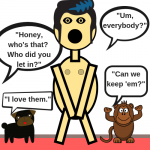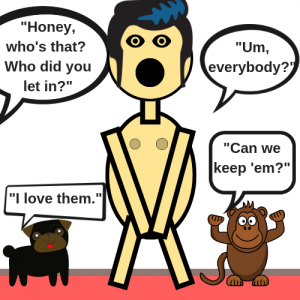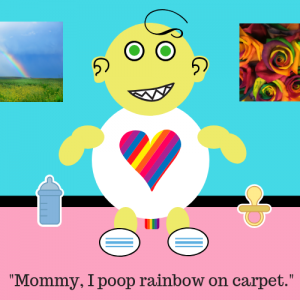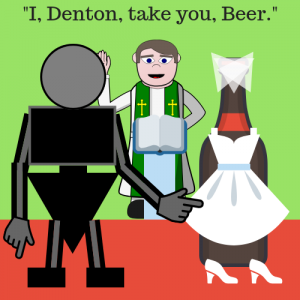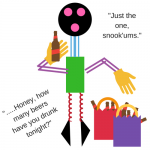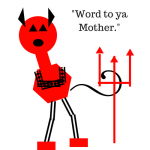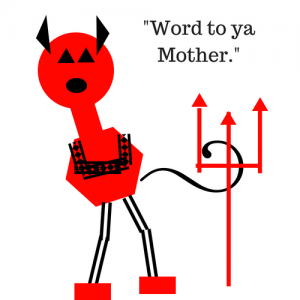
There’s a line in Good Will Hunting that always stuck with me. The irony of it. The hypocrisy. The foreshadowing. It had everything, simply because of who Sean was in real life. After I found out Robin Williams was just like me – an alcoholic – and I heard him speak that line when I watched it again, I remember watching his face. I don’t recall the first time I watched that movie or the fifth, but I absolutely LOVE that movie. And as I write this, I can still see him and Matt Damon sitting on that bench in the park and I can hear his voice saying it.
Sean says to Will, “Unless you want to talk about you, who you are. Then I’m fascinated. I’m in. But you don’t want to do that, do you, sport? You’re terrified of what you might say.”
That’s more than a great few lines. Much more. It’s a look inside the mind of an alcoholic. It wasn’t intended to be, but it is. We alcoholics don’t want to talk about us, who we are. There are a million recovering alcoholics that would drop everything to help, to soak up our words and be fascinated by them. They would be all in to help us. But we alcoholics don’t want to talk about it. We are absolutely terrified of what we might say.
Robin Williams was an amazing actor to me. He was amazing because the more I got to know about him, and the more I watched him in movies, I could see the darkness. I’ve read stories of where other people could, too. He covered it all up so well by being one of the funniest people that has ever lived, but his dramatic roles didn’t require a great deal of acting.
I think he loved roles like Good Will Hunting and Dead Poets Society and Patch Adams and One Hour Photo that had a darkness to them in which he could escape because he got to almost tell the world a little about the darkness without it being Robin Williams who was spilling his guts out to the world. He got to be Sean or Adrian or Patch or Seymour, not Robin. And every time he had a dramatic role, he got to take a little piece of his troubled soul and show just enough of it where we were fascinated. We were all in.
All of this is complete speculation on my part, but I’m probably not off by much if I’m off at all. Alcoholics struggle mightily with depression and reclusiveness and anxiety and some, like Robin Williams, try to disguise the torment with humor. And he did it SOOOOO well. He was one of the few actors in my lifetime that I was pretty doggone sad when he died. That was 2014. I was still three years away from sobriety. Not only did his death hurt me a little, I remember being a little jealous. That’s what alcoholism does to a man. It eventually makes him want to die.
Robin Williams went to rehab at least twice. He fell off the wagon twice. He was sober and clean for 30 years between the cocaine and alcohol days of the 1970’s and when he started drinking again in 2003. Thirty damn years of sobriety, gone. How does a man let that happen when all around him there are people who would drop everything if they knew he needed to just open up and TALK? He could have gone to ANY Alcoholics Anonymous meeting in America and twenty people would have sat with him all night to keep him from drinking.
The answer is that when stress or depression or some other excuse causes drinking to become a viable option in an alcoholic’s life, he or she will not talk about it to ANYBODY. They don’t want to. When they are at that place, it’s over. At every AA meeting across America today (no matter the day you’re reading this,) some meeting leader is telling the group that they need to “call their sponsor” if they’re ever in trouble. Sometimes that simply is not going to happen. When an alcoholic already has their mind made up, which takes surprisingly little time, there is no way in hell they’d call their mama just to thank them for the lasagna she brought last week. They want to talk to NO ONE because then they would have to talk.
And as Sean said in Good Will Hunting, “You’re terrified of what you might say.” I’ll add to it. They’re also terrified of what they might DO if someone finds out they are leaning towards drinking again. When falling off the wagon is a viable option, there better not be a damn soul standing in their way or they will get flattened by the obsession that is alcoholism. Nothing will stand in their way, so why in the hell would they call their sponsor?
That’s why it’s possible to go 2, 5, 10, or even 30 years and just rip the sobriety label up in less than 30 seconds. That first drink was a foregone conclusion as soon as they made it a viable option. That’s how easy it is to fall off the wagon. And it almost always happens because they WANT it to.
I had somebody I know pretty well fall off the wagon recently. Over five years of sobriety gone in the blink of an eye. He wanted it to happen. He couldn’t handle the stress of life (or whatever it was; the reason doesn’t really matter) and it was enough of an excuse to start drinking again. And then he told me it happened two years ago. He hadn’t even attempted to get back on the wagon in two damn years. Hid it from his family, his job, everybody. For two years everybody that knew he was an alcoholic thought he was still sober. That’s insane. But I can completely understand how it can happen.
I remember the only emotions I really felt when he told me were sadness and inquisition. I was sad for him, but mostly I was sad for his wife. She had come with him to AA meetings a couple of times. Just a great lady. And it had to be one of the most deflating moments of her life. I think about my wife in those instances, too. How would she handle it? The best and only answer is, “Not well.”
The inquisition focused on a very simple and blunt series of questions that are all related. How the hell did this happen, how did he let it happen, and how can I keep it from happening to me? But the simple answer is the correct one, and it answers all of them. He wanted it to happen. He never intended to call a single damn soul because they would have tried to talk him out of it. They preach “Call your sponsor” at every AA meeting, but the reality is, when an alcoholic makes alcohol a viable option, most of the time the only phone call they’ll make is to God or the devil, depending on their anger and depression levels. They have already made up their mind. Why in the hell would they call somebody who might make them stop?
So what do we do as their friend? I thought a LOT about this question during the day he told me because he asked me to join him at AA that night. I of course said yes. That was the obvious and only answer. You have to support him no matter what because he would damn sure do it for you. He could have fourteen white chips because of screwing up so frequently, but I must support him until the end. Tonight could be the one that finally sticks. And the next wagon-faller could be me. IF I make it a viable option.
Several weeks later, I’m still a little jolted by it. This guy was a sobriety mentor to me and he didn’t even know it. I looked at him and thought, “There is a man content with the ‘forever’ part of sobriety.” And that’s a BIG word for a lot of us alcoholics. Content. I’m sixteen months sober and I am NOT content yet. I’m content with today – I know I will not drink or dip today – but to say I am fully content with the “forever” part of sobriety would be a lie.
It absolutely sucks for him, but I’m okay that he jolted me a little bit. It’s oddly healing for me. I needed to see how easy it was to go back, especially by somebody I thought never would. I think it’s even okay that HE was jolted by it a little bit. When he finally got caught, it was probably the kind of jarring embarrassment that he needed to never let it happen again. Probably.
The person I feel most sorry for is not him, however. He did this to himself and he knows it. He’s a big boy and he’s taking responsibility for it. He’s doing exactly what he should do in that respect. But I absolutely HATE it for his wife. It’s not fair to her. I know life sucks and it’s not fair, but alcoholism is probably one of the more severe and chronic tribulations with which a spouse must live. It affects literally every support beam in the foundation of a marriage. It gives a spouse undue worry and stress every single day of their life, and what makes that suck even worse is that they have ZERO control over it and ZERO escape from it.
Just consider the things a spouse must worry about. Is he going to bankrupt us with his drinking? Will he get fired? Is he going to get so drunk that he cheats on me and doesn’t remember? Is he going to show up tonight? Will he ever turn violent as a result of this? Is he going to drive with my babies in the car after he’s been drinking?
Spouses are NEVER given the luxury to stop worrying or even to take a break from it. There is this mountainous lack of trust that has been thrust upon them, and they’re the ones responsible for dealing with it. It just sucks for them. I have no idea how to explain or describe that any further. They deserve a hell of a lot more pity than their damn spouse does, I can assure you of that.
But I don’t think it’s okay for me to pity the alcoholic that falls off the wagon, no matter how close they are to me and no matter how much of a mentor I consider them to be. They do NOT need pity. Pity is the alcoholic equivalent of some random person in the crowd singing “Kum ba yah” at a murderer’s sentencing before the judge says, “Okay, that’ll be good enough. You’re free to go.” I really don’t think that analogy made any sense whatsoever, but that’s okay because showing pity to a wagon-faller makes no sense either.
When somebody you know falls off the wagon, your ONLY job is to support them and be there for them if they need you. I don’t think it’s okay to say something like, “You stupid dumbass. What were you thinking?” That’s just not okay. You can be a good listener and give advice when its asked for, but it is NOT your job to give any unsolicited advice or condemn them. Every thought a man can have has already flooded his brain. He knows every piece of advice you could give him. He knows how everybody will react if or when they find out. He knows how disappointed his wife will be. But it is absolutely not my job to dole out advice to people who have fallen off the wagon. He knows he needs to be yelled at, but between he and his wife, nobody needs to add to that yelling.
Have you ever had a boss or parent who tells you three different ways that you screwed up when you already know you screwed up? And by the end of their diatribe you actually WANT to screw up again just to give that person a big fat “F**k you” just because it will appease your boiling anger? And the reason you got so angry during the diatribe is because you already knew – in perfect, vivid detail – exactly how, what, when, where, and why you screwed up. You really don’t need anybody to tell you again.
That’s how I felt when I found out he fell off the wagon. I listened, we went to AA together, I asked how his wife was doing, and then I stepped back. I let him talk if he wanted to. If I had nothing unique or philosophical to offer, why would I say anything? Everything I could have said had already gang raped his brain for days, weeks, months, or possibly even years, because he subconsciously knew there would be a day that it ended. And he knew it would probably not end on his terms.
Robin Williams as Sean Maguire is one of my favorite characters in my lifetime. Him playing Patch Adams was another. It makes me want to go back after writing this and watch both of them again, but especially Good Will Hunting. The words he says and the heart he displays reminds me so much of the dark dungeon of alcoholism, even if that’s not the actual subject matter of the movie. You could take his quotes out of that movie and apply them to a LOT of topics ranging from addiction to depression to suicide to fear. But then he says something that gives you a little bit of hope, even for those who have just destroyed their families with their return to alcohol.
“You’ll have bad times,” he says. “But it’ll always wake you up to the good stuff you weren’t paying attention to.”
Yep.

